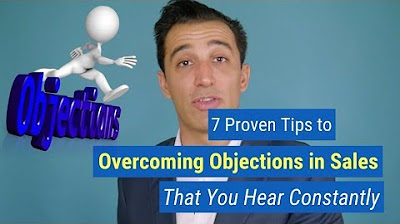Raw and Uncut Sales Role Play- Grant Cardone
Summary
TLDRIn this engaging sales training transcript, a participant practices addressing customer objections. The dialogue highlights the importance of listening to the customer's concerns, agreeing with them to build rapport, and then addressing specific issues like past product failures. The trainer emphasizes the need to make the product indispensable, like essential office utilities, and offers a compelling five-minute demonstration to prove its value, aiming to overcome resistance and close the sale.
Takeaways
- 😀 The script is a role-play scenario focused on sales and customer engagement.
- 🤔 It emphasizes the importance of understanding customer objections and addressing them effectively.
- 🗣️ The dialogue highlights the need for salespeople to listen and encourage the customer to express their concerns.
- 🔄 The script suggests that agreeing with a customer's concerns can be a powerful tool to build rapport.
- 💡 It illustrates the technique of using customer's doubts to introduce successful experiences of other customers.
- 📚 The role-play includes a discussion about the importance of training and the need for products to be used effectively.
- 💼 The script points out that salespeople should focus on the value of a product and how it can be integrated into the customer's routine.
- 👥 It demonstrates the need to identify and understand the customer's existing habits and preferences to tailor the sales pitch.
- 🔑 The dialogue shows the salesperson trying to find a 'key' product or service that the customer already uses and values.
- ⏰ The salesperson offers a short demonstration to prove the product's value and ease of use, emphasizing a no-risk proposition.
- 👍 The script concludes with a call to action, asking for a brief time commitment from the customer to see a product demonstration.
Q & A
What is the main issue the speaker is addressing in the script?
-The speaker is addressing the issue of why customers did not purchase a product and how to effectively engage with them to understand their concerns and potentially change their minds.
What is the initial approach the speaker suggests when a customer expresses doubt about a product?
-The speaker suggests agreeing with the customer's doubt as a way to hook them into the conversation, showing empathy and understanding before addressing their concerns.
What is the role of the person who is practicing selling in the script?
-The person practicing selling is trying to improve their sales skills by role-playing a scenario where they attempt to convince a customer who initially did not buy the product.
What does the speaker mean by 'you need to get me to talk' in the context of the sales conversation?
-The speaker is emphasizing the importance of listening to the customer's concerns and allowing them to express their doubts or reasons for not purchasing the product, rather than the salesperson dominating the conversation.
What is the speaker's strategy for dealing with a customer who believes the product won't work?
-The speaker's strategy involves acknowledging the customer's concerns, relating to similar experiences with other customers, and then trying to find a common ground or a specific feature of the product that the customer might find valuable.
What example does the customer in the script give to illustrate their skepticism about the product?
-The customer cites the example of a CRM system and a swimming pool that initially excited people but were not used after some time, indicating a pattern of initial interest followed by disuse.
What is the significance of the speaker's mention of 'training' in the context of the product?
-The speaker is trying to understand if the customer's reluctance to purchase is due to a lack of training or understanding of how to use the product effectively.
What does the speaker mean by 'reverse it' in the script?
-The speaker is suggesting a role reversal where the customer stands in the salesperson's position to experience the sales pitch from a different perspective, which might help them understand the sales process better.
What is the speaker's final proposal to the customer in the script?
-The speaker proposes to spend five minutes demonstrating the product, guaranteeing that the customer's people will use it as they do with essential facilities like parking spots, computers, and toilets.
What is the underlying message of the speaker's approach to sales?
-The underlying message is the importance of understanding the customer's perspective, addressing their concerns directly, and offering a compelling reason or demonstration that shows the product's value and utility.
Outlines

此内容仅限付费用户访问。 请升级后访问。
立即升级Mindmap

此内容仅限付费用户访问。 请升级后访问。
立即升级Keywords

此内容仅限付费用户访问。 请升级后访问。
立即升级Highlights

此内容仅限付费用户访问。 请升级后访问。
立即升级Transcripts

此内容仅限付费用户访问。 请升级后访问。
立即升级浏览更多相关视频

Diffuse Sales Objections With This Technique

NEVER GET A PARTNER OBJECTION AGAIN

Dad Home Schools Kid on How To Sell

How to Sell Your Product or Service - Delivering a Sales Presentation (Part 7 of 11)

7 (Proven) Tips to Overcoming Objections in Sales That You Hear Constantly [Avoidance]

[On Demand Webinar] Objection Handling Battlecard
5.0 / 5 (0 votes)
